Walk the Line Blu-ray Movie
HomeWalk the Line Blu-ray Movie 
20th Century Fox | 2005 | 136 min | Rated PG-13 | Feb 02, 2010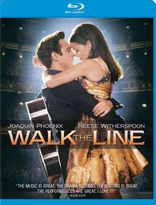
Movie rating
7.8 | / 10 |
Blu-ray rating
| Users | 4.7 | |
| Reviewer | 4.0 | |
| Overall | 4.6 |
Overview
Walk the Line (2005)
In 1955, a tough, skinny guitar-slinger who called himself J.R. Cash walked into the soon-to-be-famous Sun Studios in Memphis. It was a moment that would have an indelible effect on U.S. culture. With his driving freight-train chords, steel-eyed intensity and a voice as deep and black as night, Cash sang blistering songs of heartache and survival that were gutsy, full of real life and unlike anything heard before. That day kicked off the electrifying early career of Johnny Cash. As he pioneered a fiercely original sound that blazed a trail for rock, country, punk, folk and rap stars to come, Cash began a rough-and-tumble journey of personal transformation. In the most volatile period of his life, he evolved from a self-destructive pop star into the iconic "Man in Black" facing down his demons, fighting for the love that would raise him up, and learning how to walk the razor-thin line between destruction and redemption.
Starring: Joaquin Phoenix, Reese Witherspoon, Ginnifer Goodwin, Robert Patrick, Dallas RobertsDirector: James Mangold
| Romance | Uncertain |
| Period | Uncertain |
| Biography | Uncertain |
| Music | Uncertain |
| Melodrama | Uncertain |
| Drama | Uncertain |
Specifications
Video
Video codec: MPEG-4 AVC
Video resolution: 1080p
Aspect ratio: 2.40:1
Original aspect ratio: 2.39:1
Audio
English: DTS-HD Master Audio 5.1 (48kHz, 24-bit)
English: Dolby Digital 2.0 (224 kbps)
French (Canada): Dolby Digital 5.1
Spanish: Dolby Digital 5.1 (448 kbps)
Subtitles
English SDH, Spanish, Cantonese, Korean
Discs
50GB Blu-ray Disc
Single disc (1 BD)
Playback
Region A (locked)
Review
Rating summary
| Movie | 4.5 | |
| Video | 4.5 | |
| Audio | 4.5 | |
| Extras | 4.0 | |
| Overall | 4.0 |
Walk the Line Blu-ray Movie Review
“You can’t help nobody if you can’t tell ‘em the right story.”
Reviewed by Casey Broadwater February 10, 2010Where did Joaquin Phoenix go? The shaggy beard, the Wayfarers, the gum-chewing, rap, and slurred speech were all part of some elaborate cultural prank, we can presume, but where’s he been since then? I mean, that was so 2008. The guy just dropped off the map of Hollywood relevancy. Oddly enough, director James Mangold’s Johnny Cash biopic Walk the Line— starring Phoenix—pulled a disappearing act on us too, right around the same time. After appearing on Blu-ray in the U.K. and France in late 2008—as the 153-minute Extended Cut—mum was the word on a U.S. release. I’m not sure what caused the nearly 16-month delay, but the film has finally washed up on U.S. shores, albeit with its truncated, 135-minute theatrical running time. Some viewers might feel short shrifted, but this is supposedly the director’s preferred cut, and after seeing both versions, I think I share his preference for the leaner, tighter iteration. That said, you don’t have to be a psychic to predict that the powers that be at 20th Century Fox will inevitably pull the old double dip routine on us, giving us some kind of 2-disc collectors edition in the future that contains both cuts of the film. For those not willing to wait, though, this release is an effective remedy for the Cash-withdrawal that ails ya.
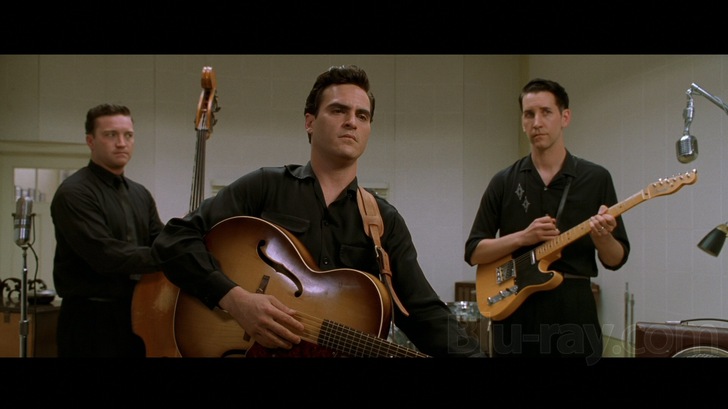
The fateful audition for Sam Phillips of Sun Records...
Making a biopic is always a tricky proposition, especially when you’re dealing with someone as iconic and conflicted as Johnny Cash, the Man in Black himself, a country western superstar who is somehow the great-granddaddy of both contemporary Christian crossover music and punk rock’s finger-to-the-man, anti-authoritarian attitude. This was a guy who did a voice recording of the entire New Testament and covered a Nine Inch Nails song. Talk about range. His personal life was just as varied, with enough ups and downs to fuel the more than one thousand country songs that he penned in his lifetime. So, how do you decide where to start, what to show, what narrative line to walk? Director James Mangold and co-writer Gill Dennis have effectively boiled down the events of Cash’s life and arrived at a three-note thematic essence, comprised of Cash’s ice cold relationship with his father, his long-time love affair with June Carter —played with spunk and grace by Reese Witherspoon—and his nearly career destroying addiction to narcotics.
The film begins on a moment of anticipation and reflection. The inmates at Folsum Prison are all riled up for Cash’s big 1968 comeback concert while his backup band, The Tennessee Three, lays down their characteristic boom-chicka-boom boxcar rhythm. Meanwhile, in the prison’s workshop, Cash fingers the blade of a circular saw, his mind fermenting some dark memory. We flash to 1944 and witness the childhood trauma of Johnny’s brother dying in a freak woodshop accident. His resentful father (Robert Patrick) claims, “The Lord did this. He took the wrong son.” It could easily play as cliché, but the sequence is rooted in historical authenticity, and from the interviews I’ve read, the incident really did play a formative role in Cash’s psyche. He was the bad son, the black sheep. From here, the story moves linearly through Cash’s life. We see his initial attempts at songwriting while stationed at an Air Force base in Germany, his hot and cold marriage with his first wife Vivian (Big Love’s Ginnifer Goodwin), and his first hit record, “Cry, Cry, Cry.” Eventually, the touring life takes its toll. Cash’s marriage collapses under infidelity, his tour with June Carter—the other woman—falls apart, and his nasty drug addiction escalates, leaving him embittered and alone. Redemption is the theme here, though, and June Carter is Johnny’s redeeming angel, sweeping down to help save him from himself, even as their love puts them both in a ring of fire that burns, burns, burns.
Walk the Line certainly follows the conventional biopic format—genius with a troubled childhood obtains success, succumbs to a tragic flaw, and then rises from the ashes of his failures —but hey, that’s what makes Johnny Cash’s story so universally compelling. If the narrative feels a little cut-and-paste, it’s at least glued down and never flies off on any unnecessary tangents. What the script lacks in adventurousness, it makes up in cohesiveness, resonance, and, above all, passion. There are no half-measures here; from the performances to the music to the period set and costume design, this is a project where everyone involved seems to feel strongly about getting it right, about doing justice to the legend of a real-life American folk hero. At the center is Joaquin Phoenix, tasked with the impossible. He bears a passing resemblance to a young Johnny and his voice at times comes strikingly close to Cash’s inimitable bass-baritone, but Phoenix’ acting isn’t about mere imitation, it’s about cracking the hull of Cash’s dominant public persona— the romantic outlaw—and giving us a look at the man underneath. It’s a guesstimate, sure—all biopic acting is—but Phoenix is totally convincing, from the awkward, giddy joy he shows after cutting his first single at Sun Records, to the drugged-out swagger and thousand-yard-stare of a man on his last legs.
Of course, the film would be nowhere without the proper June, and Reese Witherspoon is the one, fully deserving of the Academy Award she won for her performance. Giving us all sides of June—the chipper, country gal stage act, the no-nonsense, independent woman, and the wounded divorcee, ashamed to have let down her God-fearing fans—Witherspoon works wonders with the multi-faceted role. When she and Phoenix are onscreen together, whether singing a duet or just lying together in a hotel bed, their interactions are subtle and dynamic, built out of furtive looks, loving pleas, and all the complex and often contradictory emotions that play on the faces of lovers on an uncertain course. Just as impressive, the two play their own instruments and sing their own songs, no voice doubles required. Emotionally, and performance-wise, Walk the Line finds it very, very easy to be true.
Walk the Line Blu-ray Movie, Video Quality 
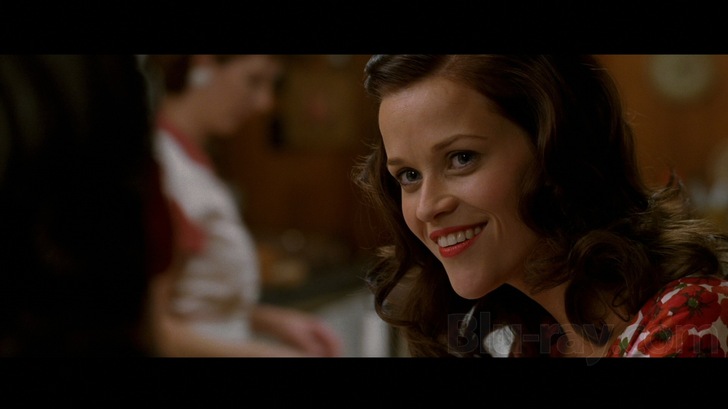
"Sharp as a razor, steady as a train," is how Cash's music is often described, but it's also a good descriptor for Walk the Line's 1080p/AVC-encoded transfer, which is consistently crisp and beautifully colored. The 2.39:1-framed image seems identical to the Extended Cut that was released in Europe in late 2008, and that's a good thing, as Walk the Line's rich, filmic look has been preserved with no unnecessary additives like edge enhancement or detail- scrubbing DNR, and no banding, blocking, or other compression-related corrupters. With the exception of a few noticeably soft shots—I'm thinking of Cash stumbling through the woods in the rain—overall clarity is excellent, down to the smallest detail. See the simultaneously gritty and shiny texture of Joaquin's face, covered in sweat and stubble after several days of cold turkey withdrawal. Notice the weft in Cash's mother's straw hat at she picks cotton, or the ribbing in Cash's "wife beater" undershirt. And color reproduction easily keeps pace with clarity. Cinematographer Phedon Papamichael has drenched the film in hues that are nostalgic but not sentimental—creamy off-whites, rich honey browns, and the woody sunburst gradients of a vintage Gibson guitar. Skin tones are natural, contrast is tight, and fittingly for the Man in Black, black levels are deep while preserving shadow detail (see Cash's black suit for proof). All of this comes together to create an image that, like the film, is full of depth and life.
Walk the Line Blu-ray Movie, Audio Quality 
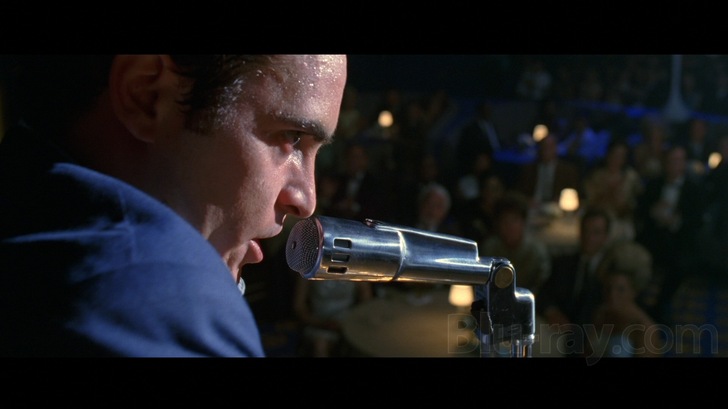
As you'd expect and hope from such a music-centric film, Walk the Line's DTS-HD Master Audio 5.1 surround track is a blissfully immersive, dynamically solid experience that truly captures the boom-chicka-boom intensity of Johnny Cash and the Tennessee Three. Even from the beginning of the film it's easy to fall in love with the sound design. We hear a low, steady rumble outside the prison, heavy with LFE engagement. As a tracking shot takes us closer to the buildings, the sound becomes clearer and clearer—it's a twanging two-step shuffle that builds along with the claps and chatter of prisoners awaiting the arrival of the Man in Black. The musical sequences sound simply fantastic; bass pours forth into the audience, guitars go from chickenscratch rhythms to glassy solos, brushes snap cleanly at a snare drum, and above it all, Joaquin Phoenix lets loose with his best bass-baritone Cash impression, his voice soaked in reverb. While these are the film's most sonically engaging moments—you'll frequently feel like you're up on stage with Cash or else out swaying in the audience—even the quieter scenes are filled out with detailed ambience, like a prison guard's jangling keys, thunder peeling in the rear channels, chirping birds and seething insects. Dialogue is always clean, easy to understand, and natural-sounding, and as my colleague Dr. Svet Atanasov noted in his review of the film's French release, the way Phoenix says "Hello, I'm Johnny Cash" will send shivers down your spine.
Walk the Line Blu-ray Movie, Special Features and Extras 
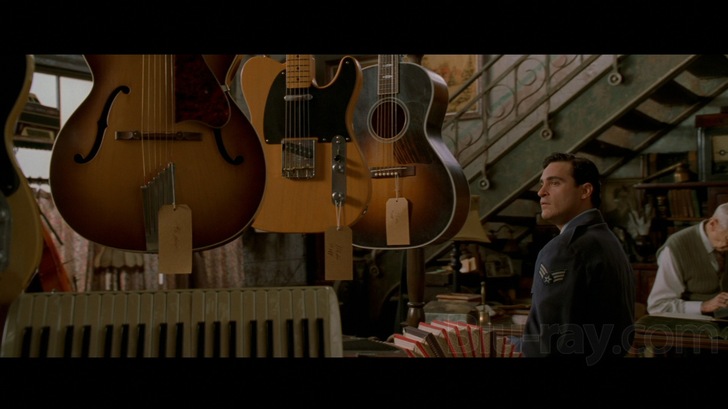
Feature Commentary by Co-Writer and Director James Mangold
Mangold's track is simply a must-listen for Cash fans. Not only does the director give a wealth of
information about the production of the film, but he also relates several stories about his
meetings with Johnny Cash. My favorite anecdote is when he tells us about asking what Cash's
favorite film was. Cash said it was the original Frankenstein, because it's about a man
made up of "all these bad parts" but who still tries to achieve some manner of goodness. That
just about sums up Walk the Line.
More Man in Black - Deleted Scenes (1080p, 23:13)
The disc includes ten deleted scenes, some of which eventually made their way into the Extended
Cut. I highly recommend listening to the optional commentary by director James Mangold, who
discusses in detail why each scene was cut.
Extended Musical Sequences (1080p, 5:40 total)
Here we get extended versions of "Rock and Roll Ruby," "Jackson," and "Cocaine Blues," but
we're missing five extended songs that were included on the French and U.K. releases of the
film.
Featurettes
Folsum, Cash & the Comeback (SD, 11:47) is the story of Cash's comeback show at
Folsum Prison and the subsequent live record, as told by several musicians and writers.
Celebrating the Man in Black: The Making of Walk the Line (SD, 21:38) is one part
condensed story—illustrated with the clips from the film—and one part behind-the-scenes
documentary, including interviews with just about everyone involved. Lastly, Ring of Fire: The
Passion of Johnny & June (SD, 11:29) is a history of the two soulmates' relationship. Missing
in action is the 12-minute segment on Cash's faith that was included in the European
releases.
Theatrical Trailer (1080p, 1:49)
Walk the Line Blu-ray Movie, Overall Score and Recommendation 

I have nothing but good to say about director James Mangold's Walk the Line, which somehow distills Johnny Cash's life and spirit into two hours and fifteen minutes, delivering riveting performances and rip-roaring musical numbers along the way. The film looks and sounds fantastic on Blu-ray, and while die-hard Cash fans may want to hold out for the inevitable release of the Extended Cut, the theatrical version is just fine by me. Highly Recommended.
Other editions
Walk the Line: Other Editions
Similar titles
Similar titles you might also like

Sparkle
2012

Ray
2004

A Star Is Born
2018

Judy
2019

Young Man with a Horn
Young Man of Music / Warner Archive Collection
1950

Love Me or Leave Me
Warner Archive Collection
1955

Crazy Heart
2009

Finding Neverland
2004

Les Misérables
1998

Les Misérables 4K
2012

Mao's Last Dancer
2009

Gia
1998

Seven Pounds
2008

The Eddy Duchin Story
Limited Edition to 3000 - SOLD OUT
1956

The Notebook
2004

The Danish Girl
2015

Water for Elephants
2011

The Cider House Rules
1999

The High Note
2020

The Duchess
2008


